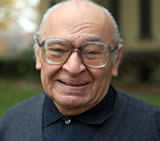
The “preferential option for the poor,” an inescapable aspect of Church teaching since the Gospels were written, is recurrent in liberation theology because, as Father Gustavo Gutierrez, O.P., says, “real, material poverty, this less-than-human situation in which most human beings live today, is a challenge which no Christian is free to overlook.”
An ebulliently cheerful man whose bantam physique belies the volcanic impact of his theological work, the Notre Dame professor of theology is now at work on a book on the history and theological significance of the preferential option for the poor. His 1971 book, A Theology of Liberation: History, Politics, Salvation, is still considered the most influential and lasting expression of liberation theology.
Beginning in the late 1960s, liberation theology became an explosive force in the Third World, particularly in Latin American countries. Many Christians there believed that a preferential option for the poor obligated them to confront and transform oppressive military regimes and economic structures, even, in some cases, in alliance with armed revolutionaries.
The pained reaction of ecclesial authority to such alliances was memorably expressed during Pope John Paul II’s 1983 visit to Nicaragua, whose then-Marxist government included Catholic priests among its cabinet officials. When one of these, Rev. Ernesto Cardenal, knelt before John Paul to kiss the papal ring, he received a globally televised scolding. “You must straighten out your position with the Church,” John Paul thundered, wagging his finger at Cardenal but symbolically at numerous other church people as well.
Whatever political arrangements it may be said to support, what liberation theology clearly rejects is the notion that the suffering of the poor is simply the will of God, adequately addressed by acts of charity from the wealthy.
“You will surely remember the statement of that good man Dom Helder Camara,” Gutierrez says, referring to the late archbishop of Recife, Brazil. Camara famously said of those turbulent years in the 1960s when he began to champion the poor: “When I give food to the poor, they call me a saint. When I ask why the poor have no food, they call me a Communist.”
Gutierrez is himself no stranger to controversy. During the 1980s and ‘90s, he was among the theologians whose work was exhaustively and unsympathetically analyzed by the Vatican’s Congregation for the Doctrine of the Faith. Pope Benedict XVI—Cardinal Joseph Ratzinger in those days—was the prefect of the congregation and the principal investigator. In 1983, while Gutierrez was serving as a diocesan priest in Lima, the congregation complained to Peru’s Catholic bishops about Gutierrez’ writings, but the bishops declined to condemn them.
Later, in 1984 and 1986, the congregation issued official disapprovals of certain aspects of liberation theology. Among the congregation’s misgivings were the “insufficiently critical” use it made of traditionally Marxist notions of history and social analysis, and the manner in which its emphasis on institutional evils seemed to obviate a serious consideration of individual sin. Ratzinger and his congregation saw to it that Gutierrez spent much of the 1990s writing, rewriting, revising and clarifying theological arguments.
If those controversies have left painful memories, they have not visibly affected Gutierrez’ good-natured recounting of them. “Oh yes, during those days there were difficulties and misunderstandings—some of them my own, I must say—but this is how theology, all theology, works,” he says. “But all of that is completely in the past.”
He adds, “by the way, did you hear Pope Benedict’s address at Aparecida? It was very good.”
In a homily given last May during his visit to Brazil, the pope had spoken of the “heavenly Jerusalem,” quoting both Revelations and the documents of the Second Vatican Council in a manner that reverberated with Gutierrez’ cherished commitment to the poor. “Seeing that beauty with the eyes of faith,” Benedict said, “contemplating it and yearning for it, must not serve as an excuse for avoiding the historical reality in which the Church lives as she shares the joys and hopes, the grief and anguish of the people of our time, especially those who are poor or afflicted.”
Among other indications of rapprochement between Gutierrez and the Vatican are recent publications of his work in the official journal of the Pontifical University of Saint Thomas Aquinas in Rome and the three-week theology course he taught there earlier this year on Bartolome de las Casas, a 16th century Dominican priest who defended the rights of indigenous people in Latin America. While at the Angelicum, as the university is familiarly called, he was invited to attend the Ash Wednesday Mass at which Benedict presided and was among those whose foreheads the pope marked with an ashen cross.
“You see this ‘option for the poor’ is not simply my opinion,” a beaming Gutierrez says. “It is a matter of the faith.”
Michael Garvey is an assistant director of news and information at Notre Dame.